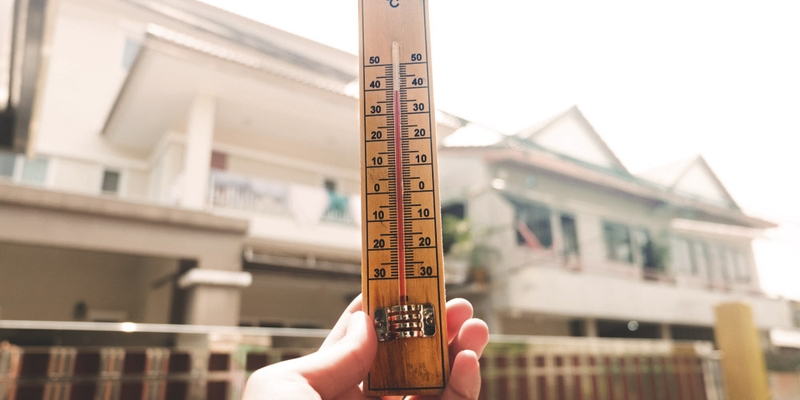
If you are not redirected within 30 seconds, please click here to continue.
Samedi: 10h – 16h HAE

If you are not redirected within 30 seconds, please click here to continue.
If you are not redirected within 30 seconds, please click here to continue.
Mortgage temperature check 2022: how recent interest rate hikes are impacting Canadian homeowners and buyers

- National RATESDOTCA mortgage quotes dropped 11% from June to July — the same month as the Bank of Canada’s 100-basis-point interest rate hike.
- The average national down payment decreased 17% from April to July, according to RATESDOTCA mortgage quoter data.
- More Canadians are comparing variable mortgage rates despite the recent rate hikes. In July, RATESDOTCA quotes for variable-rate mortgages decreased by just 2% month-over-month (MoM) versus a 20% MoM decline in fixed-rate quotes.
Whether you own a home or hope to soon, mortgages have become more expensive since the Bank of Canada (BoC) raised its policy rate to 0.5% in March — the first hike since the start of COVID-19. Since then, the Bank has announced a series of rate increases, each more trying than the last, with the most recent marking a 100-basis-point jump, to 2.5%, in July.
Following this five-month interest rate incline, new RATESDOTCA data show that Canadian property owners and buyers are at a standstill. Using RATESDOTCA mortgage quoter data, we analyzed how Canadians are adjusting to record-high interest rates. Month-over-month, quotes for mortgage purchases, renewals, and refinances are slowing, down payments are shrinking, and those who are shopping the mortgage market are still showing an interest in variable rate structures despite the BoC’s hikes.
With the number of national mortgage quotes dropping 11% in July from the month before, it appears many Canadians may be holding off on mortgage moves until interest rates begin to stabilize.

Number of mortgage quotes in Canada dropped in July, same month as BoC’s last rate hike
The severity of last month’s rate increase came as a surprise to many Canadians. What was expected to be a 75-basis-point hike turned out to be a full percentage-point increase — the largest in almost 25 years. A one-time jump like this has the potential to increase monthly payments by $53 for every $100,000 of a mortgage on a variable rate structure and 25-year amortization period.
The burden of a growing mortgage loan doesn’t exactly send a welcoming message to aspiring homeowners. And with no clear plateau in sight, July’s hike may have Canadians questioning whether they can afford to own property at all. In July, the number of mortgage quotes on RATESDOTCA decreased by 27% in Alberta and by 11% in Ontario.
It’s possible this most recent rate hike has stalled many Canadians in making any kind of immediate mortgage decisions, be it financing a new home or refinancing an existing one. To counteract the rate hike, some mortgage shoppers may also be waiting for home prices to drop further before making a move.
“We’ve seen a lot of buyers waiting for sellers,” says Dan Eisner, CEO of True North Mortgage. “And until sellers recognize that home prices have fallen to some amount, we’re not going to see the same number of transactions in the market until maybe later this year into next year. Sellers will eventually have to lower their price if they wish to sell.”
Average national down payment amounts are decreasing
According to our mortgage quoter data, the national average down payment dropped 17% from April to July. Despite small fluctuations in that time period, any month-over-month increases are getting smaller (21% in February versus 7% in April and 2% in July).
In Ontario specifically, the average down payment amount decreased by 1% in July (to $205,856), and in B.C., it dropped by 13% (to $214,263). This trend could largely be due to falling home prices across Canada. According to the Canadian Real Estate Association (CREA), the national average sale price declined 5% year-over-year in July. Therefore, smaller down payments may reflect smaller mortgage principals.
“If you were looking at a $1.2 million home, and all of a sudden it's now $999,000, then you have the option to just get by with 10% down,” says Eisner.
This could explain the dip in down payment amounts in both Ontario and B.C., where uninsurable mortgages, or homes worth more than $1 million that require a 20% down payment, are dominant. However, with inflation reaching 8.1% in June, the high cost of living could be another factor causing Canadians to put down only what they need to.
“Clients could be thinking ‘I'm going to put less down because I want a buffer to make mortgage payments,’” says Eisner. “But that seems less likely, since as mortgage rates rise, you could be more inclined to put more down in order to do away with the interest.”
Canadians still interested in variable-rate mortgages despite rising interest rates
Though variable mortgage rates are currently still cheaper than fixed rates, BoC data show Canadians are returning to fixed rates to prevent their mortgage payments from increasing further every few months.
According to RATESDOTCA mortgage quoter data, however, five-year variable rates are experiencing quicker month-over-month growth than five-year fixed rates. The average variable interest rate quoted on RATESDOTCA in May was 2.28%, 2.72% in June, and 3.19% in July, while the average fixed interest rate quoted in May was 3.98%, 4.32% in June, and 4.8% in July.
Even though fixed-rate mortgages comprised 49% of all home loans in May, according to the BoC, RATESDOTCA data show that Canadians are still interested in variable mortgages. Nationwide, variable mortgage quotes on RATESDOTCA comprised 59.1% of all quotes In July, compared to fixed rates, which comprised 40.9% of all quotes.

Variable rates have been steadily higher than fixed rates since April, with fixed-rate quotes dropping 20% in July, versus only a 2% drop in variable quotes. And the mortgage stress test, a financial rite of passage for would-be homeowners, could have something to do with the conflicting trends.
“Normally it is predominantly fixed compared to variable,” says Eisner, of Canadians’ mortgage rate preference. “For the last few months, it’s been strongly variable versus fixed, with the qualifying rate being lower for variable, but as prime goes up, that qualifying rate goes up.”
Qualifying for a mortgage from an A or B lender requires you to show you can afford payments at an interest rate two percentage points higher than your agreed-upon interest rate, or at the BoC’s qualifying rate of 5.25%, whichever is higher.
It’s also essential to keep long-term financial impact in mind when financing your home. For most, locking in a fixed rate while they’re at their highest may not be sustainable.
“Five-year fixed rates are at or near their peak, so if they go up maybe only about a quarter point, then it makes more sense to go with variable,” says Eisner. “The worst-case scenario is the five-year fixed rate as it is.”
How can homebuyers and owners respond?
Interest rate hikes have left many Canadians concerned about their financial security. The decision to buy or sell your home is a personal one. And there may never be a perfect time to do either. But following market trends can help inform your next move.
According to Eisner, housing prices may reach their lowest point by the end of Q1 in 2023, so if you’re looking to buy, there is still an opportunity to save on the principal portion of your mortgage.
“I imagine there are sellers out there who eventually will say look, I just have to sell at this point,” says Eisner. “And market peak is usually around that time.”
As a homeowner, you can take advantage of the value you have when it comes to renters. “Your safety net, if you can't sell it, is just to rent it out,” says Eisner. “Rents are good enough to justify the mortgage payment.”
Regardless of which boat you’re sitting in, comparing your financing options is always the easiest way to find the lowest rate available when shopping your mortgage.
Interested in creating content with RATESDOTCA? Contact us at email@rates.ca.
Compare Mortgage Rates
Engaging a mortgage broker before renewing can help you make a better decision. Mortgage brokers are an excellent source of information for deals specific to your area, contract terms, and their services require no out-of-pocket fees if you are well qualified.
Here at RATESDOTCA, we compare rates from the best Canadian mortgage brokers, major banks and dozens of smaller competitors.
Get money-saving tips in your inbox.
Stay on top of personal finance tips from our money experts!









